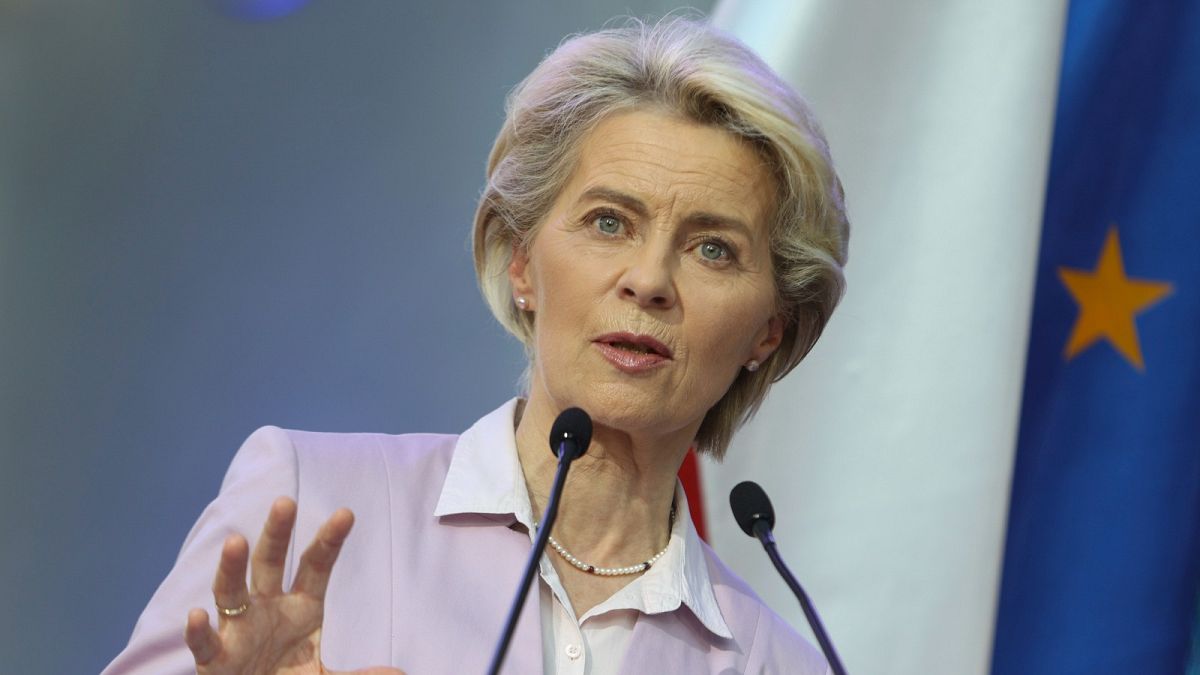MEPs urged the Commission to withhold payments until all judicial reforms are carried out.
Ursula von der Leyen has defended her controversial decision to approve Poland's €35-billion recovery plan, arguing the judicial reforms that Brussels has imposed serve as "leverage" to restore the rule of law.
The president of the European Commission made her case before the European Parliament, where lawmakers urged her to withhold all payments until Warsaw has proven the wrongdoing has been corrected.
"I know that some of you are sceptical, but let me reassure you that no money will be disbursed, until these reforms are undertaken," von der Leyen told MEPs on Tuesday afternoon.
The Polish recovery plan, which unlocks the country's allocated share of the €750-billion fund, remained on stand-by for more than a year over persisting rule of law concerns.
At the core of the dispute was the disciplinary chamber of the Supreme Court, which has the power to slap fines, salary cuts and lift immunity of magistrates according to the content of their rulings.
The chamber is largely seen as a tool of government encroachment upon the judiciary. The European Court of Justice (ECJ) has deemed the body incompatible with EU law and asked for its dismantlement.
As part of the Commission's green light, Poland has committed to fulfil three key milestones: replace the chamber with an impartial and "substantially different" court, reform the disciplinary regime and review the cases of all judges affected by its decisions, "free from inappropriate offences."
"A first payment will only be possible when a new law is in force and ticks all the boxes under this contract," von der Leyen said. "This is progress, but we are not at the end of the road on the rule of law in Poland."
The Polish government has already put forward a proposal to replace the disciplinary chamber with a new "Chamber of Professional Responsibility," tasked with vetting, rather than punishing, judges.
But legal experts and associations have warned the tweak would still grant the executive and legislative branches considerable control over the judiciary.
The Commission's condition that forces Poland to begin reviewing the cases of disciplined judges has also been criticised for falling short of an automatic re-institution. Warsaw could receive up to three payments of recovery funds until the review is completed by the agreed-upon deadline: end of 2023.
"Is everything solved? No. Certainly not. But now, we have movement in the right direction and leverage so that it leads to the results needed," von der Leyen admitted.
'Real changes rather than cosmetic'
Ursula von der Leyen also vowed her executive would continue the legal cases it has launched against Poland over the disciplinary regime and its continued refusal to enforce ECJ rulings, a disobedience that last year resulted in a record-breaking fine of €1 million per day.
The fine is being subtracted from Poland's share of the general EU budget, which is separate from the coronavirus recovery fund. Poland is also under the Article 7 procedure, a nuclear option that can deprive member states of voting rights.
"We will never stop defending the rule of law and the treaties of the European Union," von der Leyen said.
But her multiple pledges received a lukewarm reception from MEPs, most of whom took a hard line against the Commission's decision and the actions of the Polish government.
"The message is clear: money can only flow when money is safe," said Siegfried Mureșan, on behalf of the centre-right European People's Party (EPP). "Our group will not tolerate the release of a single euro until Polish authorities comply with the rulings of the European Court of Justice."
Iratxe García, the leader of the socialist group, decried the "authoritarian shift" in Poland and demanded "real changes rather than cosmetic tweaking" in order to release the funds.
Speaking for the Greens, Damian Boeselager accused von der Leyen of "caving in" to Warsaw's pressure and said he had "little trust" the three milestones would prevent judges from being punished in the future.
MEPs also reproached von der Leyen the fact she personally travelled to Warsaw to hand over the Commission's green-light. Over the next years, Poland is set to receive €23.9 billion in grants and €11.5 billion in low-interest loans, with the option of requesting an extra €25 billion in loans.
Meanwhile, Ryszard Antoni, a Polish MEP who belongs to the ruling right-wing party, said he was "disgusted" by the accusation labelled against his country and denounced the parliamentary debate as "absurd" and "irrational."
"This has nothing to do with democracy. It's the domination of one view of the world," Antoni said. "When you speak about values, it's really about blackmail."
Tuesday's debate in Strasbourg follows an unsuccessful bid by three senior liberal MEPs to launch a vote of no confidence against the tenure of Ursula von der Leyen.
"The Commission is fully aware that the remedies announced by the Polish authorities are purely cosmetic," the trio wrote in a public letter.
Following the executive's assent, the EU Council has up to four weeks to give the final approval to Poland's recovery plan by qualified majority.
